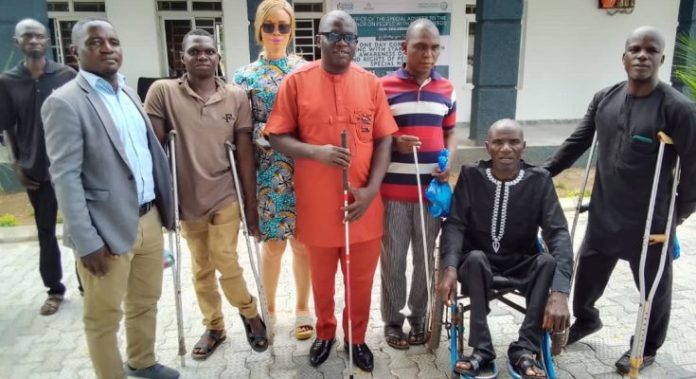Benue State, Nigeria – The voices of persons with disabilities in Benue State echoed loud and clear on Monday as they accused the Independent National Electoral Commission (INEC) of failing to provide adequate support and accessibility during the 2023 general elections. At a town hall meeting focused on electoral reforms, the disability community expressed their outrage over being sidelined in the voting process, despite federal investments aimed at ensuring their participation.
Jacintha Igwilo, a prominent leader within the disability community and Chairperson of the Benue State Albinism Association, was particularly vocal about the challenges faced by people with disabilities during the elections. Igwilo, who took it upon herself to visit multiple polling units across Makurdi, the state capital, described a deeply disappointing scene. “I went around to check how our people were being treated, and I was appalled,” Igwilo recounted. “Our people were stranded, left to fend for themselves, with no provisions in place to assist them in casting their votes.”
The absence of crucial aids for persons with disabilities was glaring. Igwilo highlighted the lack of magnifying glasses for individuals with albinism, Braille materials for the visually impaired, and sign language interpreters for the deaf. Worse still, many polling units were found to be physically inaccessible for those with mobility challenges. These failures, Igwilo argued, were not just oversight but a form of institutional discrimination against a vulnerable group, undermining their constitutional right to participate in the democratic process.
The discontentment didn’t end there. Igwilo, who also served as an election agent during the 2023 polls, revealed that she had not received her stipend for the role. “This is another example of the systemic exclusion of people with disabilities,” she added. “We are not just left out during the voting process, but even when we try to contribute to the election in meaningful ways, we are still overlooked.”
In her impassioned address, Igwilo urged authorities at all levels—local, state, and federal—to ensure that persons with disabilities are included in every phase of election planning, from voter registration to polling and results collation. “It is not enough to invest money or create laws; we need to see actual commitment to inclusion,” she said. “The disability community must be an integral part of the electoral process.”
The town hall, organized by the Peering Advocacy and Advancement Centre in Africa (PAACA), provided a much-needed platform for stakeholders to engage in meaningful dialogue about how to address the systemic barriers that marginalized groups, particularly persons with disabilities, face in the electoral process. PAACA’s Executive Director, Ezenwa Nwagwu, emphasized the importance of inclusive dialogue as the bedrock of electoral reform. He assured that the recommendations from the meeting would be compiled and presented to both the National Assembly and INEC for consideration.
Nwagwu’s sentiment was echoed by Prof. Sam Egwu, the Resident Electoral Commissioner for Benue State, who attended the event as a guest. While commending the initiative to discuss electoral reform, Prof. Egwu warned that legal reforms alone would not be sufficient to address the deep-rooted challenges in Nigeria’s electoral system. “Even the best electoral laws will fail if those in charge of implementing them lack integrity,” he noted. “The real game-changer in any election is the human agency behind it.”
The town hall meeting saw a diverse mix of participants, including civil society organizations, representatives of vulnerable groups, and media personnel. It marked a critical moment for open discussions about how to make future elections more inclusive and representative of Nigeria’s diverse population.
For persons with disabilities, the road to electoral inclusion is far from over. The frustration voiced at the town hall reflected a broader sense of neglect and exclusion that has characterized their experiences in Nigerian elections. Yet, the gathering also provided a renewed sense of hope—a belief that by working together with civil society organizations, vulnerable groups, and the media, Nigeria can move toward a more transparent, accountable, and inclusive electoral process.
The disability community, once again, stood as a reminder that democracy is most effective when all citizens, regardless of their abilities, are afforded equal rights to participate. As Nigeria looks ahead to future elections, the call for inclusion will undoubtedly continue to reverberate louder, demanding that no one, no matter their physical or mental abilities, be left behind.


